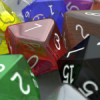Roleplaying Games - Where's the Art?

Over at Coming Out of the Basement, Jack Stephenson-Carr is engaging in an in-depth analysis of the question (and the assumptions behind the question): "Are Roleplaying Games Art?"
Here's my take on it.
Certainly they are, if they convey meaning. But they're not guaranteed to do that, because there's a lot of subjectivity involved. As a Player only you can tell me if this particular session carried meaning to you, and was therefore art for you. But of course there are more levels than that. At which level is art to be found? Let's look.
When we consider the question of what an RPG is, we can easily see a difference between the act of design and the act of play. This, along with the not-merely-serendipitous second meaning of the word "play," readily leads us to make categorical distinctions similar to those we apply to the theater. In that model, the script, with its characters, events, dialogue and stage instructions, is a piece of art designed by one set of artists called "playwrites," to be interpreted by another set of artists called "directors," who arrange and elucidate meaning (sometimes completely at odds with the writer's own) from that script.
But we're not done yet, because in order to do that, those directors rely on yet a third set of artists called "actors," each of whom brings a unique flavor to a role and extracts even more meaning from the script than the director alone.
Finally we come to that last and most abstract class of artists, and I recognize this is perhaps a philosophical point but an important one: every member of the audience is an artist in their own right, for each is determining their own internal meaning while observing the work, which meaning may be so far removed from any of the other artists' intentions that it might even be considered "wrong". And yet there it is, and they're going home right now to explain it to a friend.
Let's stop thinking about theaters for a minute and look at episodic TV shows, because I want to illustrate a point about starting and stopping. When this week's episode of a popular TV series ends, the fans get seven days to stop watching and converse with each other about what they've seen, coming to a general consensus about how it "should" be interpreted, or at least consolidating their observations from different viewpoints and coming to a more or less "common awareness" of the main themes and questions at play. And by the next week, same bat time, same bat channel, they're all pretty much on the same page and prepared to dive deeper into the storyworld.
Like I implied above, it's tempting to construct a direct 1:1 allegory between theatrical productions and the RPG industry: Game Designers are Playwrites, GMs are Directors, and Players are Actors. But at the lower end the allegory starts to break down. Because aside from the fact that the GM is also an Actor much of the time, there another important point that gets lost, and it's about this "audience" thing.
Audiences are not mere passive containers of an artist's distilled meaning. They are dynamic interpreters or even creators of meaning, and if the timing or structure of the medium allows it, they will share those interpretations with others in the audience until a certain level of group satisfaction with a general set of interpretations is reached. The act of interpretation is thus distributed across the entire audience as a whole. These distributed communications can even feed back and affect the original writers (as is often the case in soap operas, where market research can determine whether a character lives or dies).
See, both the GM and the Players ARE AUDIENCE MEMBERS as well. The face-to-face nature of the tabletop game - allowing interruption and direct interrogation like all conversation, along with the turn-based mechanic through which the fiction proceeds - empowers these audience members to update each other's artistic interpretations of the emerging storyworld in realtime, as it is happening (or almost immediately thereafter), giving them all the psychological cohesion and directional feedback capability of a fanatical TV audience - with the director sitting in their living room.
I submit that a different type of art is potentially being created at each of these levels.
Whether it makes it across to you is another question.



